Reflective Professional Practice: Models, Analysis, and Impact
VerifiedAdded on 2023/01/17
|9
|2534
|93
Report
AI Summary
This report delves into the realm of reflective professional practice, elucidating its 'raison d'etre' and significance within various professions. It justifies the utilization of reflective practices in professional settings and analyzes the purpose of reflective practice in achieving career goals. The report further provides a critical evaluation of two distinct reflective models: the Gibbs reflective cycle and Kolb's experiential learning model, contrasting their strengths and weaknesses and assessing their impact on personal and professional development. The analysis includes a detailed comparison of each model's stages, highlighting their application in real-world scenarios and their contributions to continuous learning and skill enhancement. The report concludes with a synthesis of the findings, emphasizing the value of reflective practice in fostering self-awareness, improving decision-making, and achieving long-term career objectives. It showcases how reflective practice is a continuous process that aids in personal and professional growth, enabling individuals to adapt to changes in the professional environment.
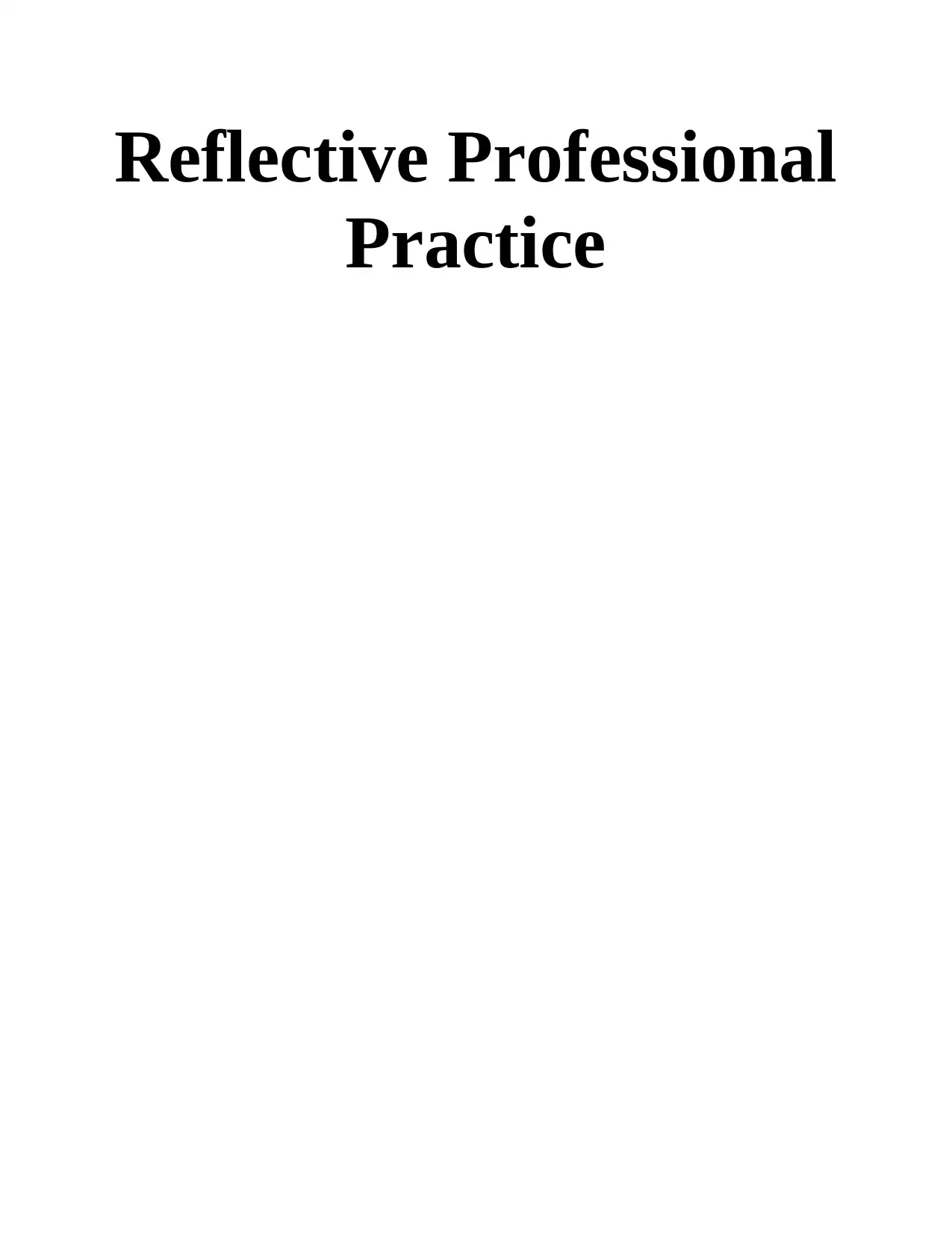
Reflective Professional
Practice
Practice
Paraphrase This Document
Need a fresh take? Get an instant paraphrase of this document with our AI Paraphraser
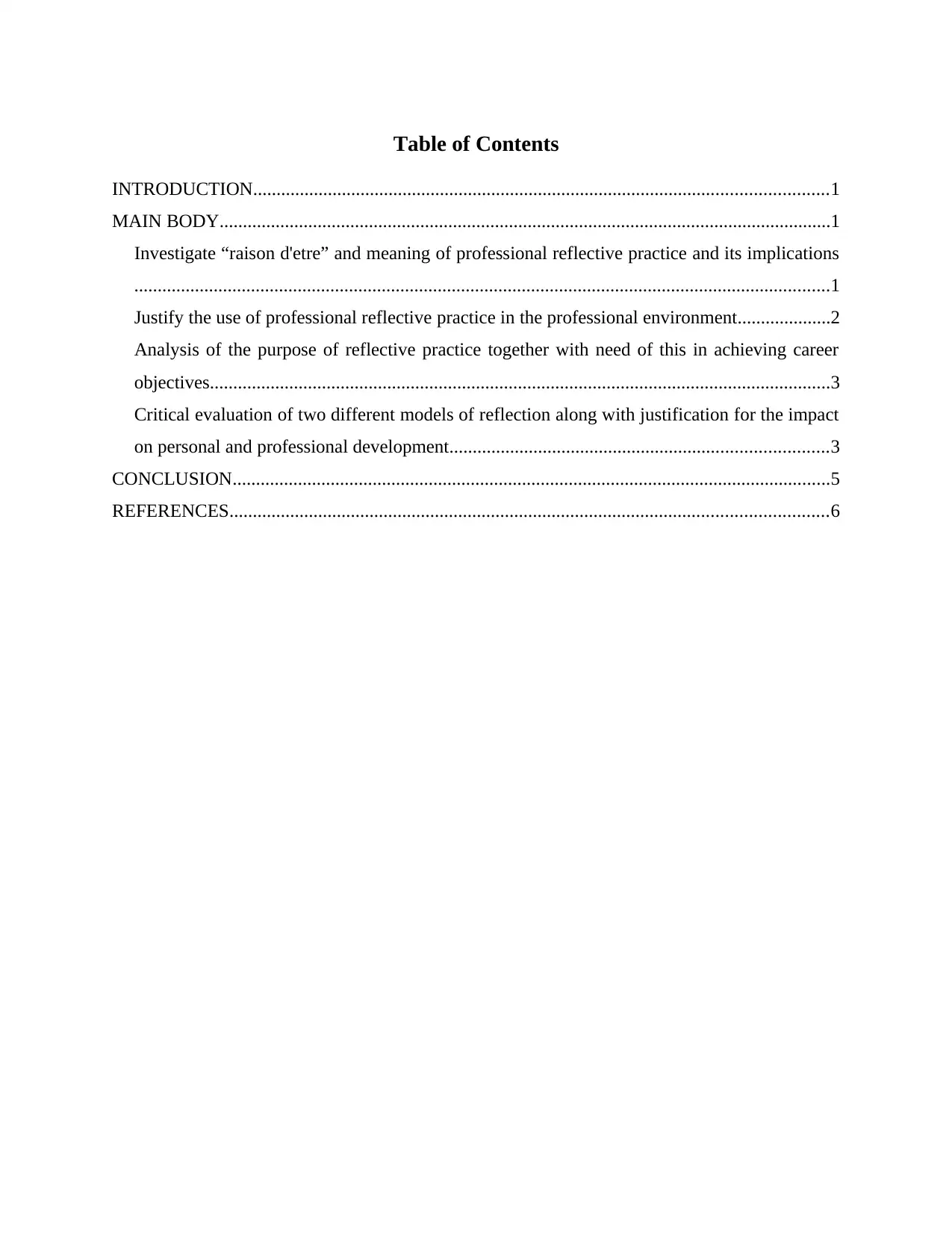
Table of Contents
INTRODUCTION...........................................................................................................................1
MAIN BODY...................................................................................................................................1
Investigate “raison d'etre” and meaning of professional reflective practice and its implications
.....................................................................................................................................................1
Justify the use of professional reflective practice in the professional environment....................2
Analysis of the purpose of reflective practice together with need of this in achieving career
objectives.....................................................................................................................................3
Critical evaluation of two different models of reflection along with justification for the impact
on personal and professional development.................................................................................3
CONCLUSION................................................................................................................................5
REFERENCES................................................................................................................................6
INTRODUCTION...........................................................................................................................1
MAIN BODY...................................................................................................................................1
Investigate “raison d'etre” and meaning of professional reflective practice and its implications
.....................................................................................................................................................1
Justify the use of professional reflective practice in the professional environment....................2
Analysis of the purpose of reflective practice together with need of this in achieving career
objectives.....................................................................................................................................3
Critical evaluation of two different models of reflection along with justification for the impact
on personal and professional development.................................................................................3
CONCLUSION................................................................................................................................5
REFERENCES................................................................................................................................6
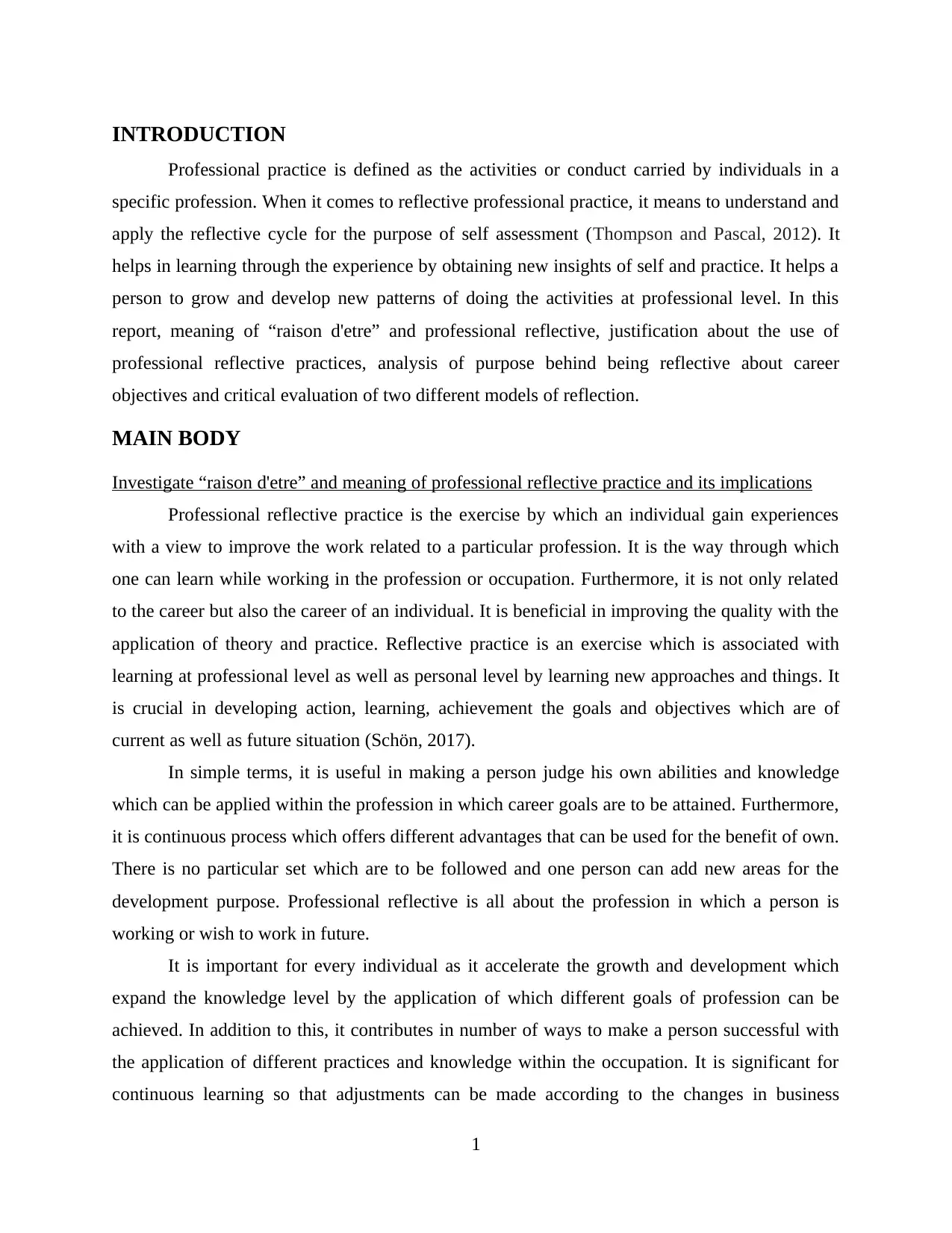
INTRODUCTION
Professional practice is defined as the activities or conduct carried by individuals in a
specific profession. When it comes to reflective professional practice, it means to understand and
apply the reflective cycle for the purpose of self assessment (Thompson and Pascal, 2012). It
helps in learning through the experience by obtaining new insights of self and practice. It helps a
person to grow and develop new patterns of doing the activities at professional level. In this
report, meaning of “raison d'etre” and professional reflective, justification about the use of
professional reflective practices, analysis of purpose behind being reflective about career
objectives and critical evaluation of two different models of reflection.
MAIN BODY
Investigate “raison d'etre” and meaning of professional reflective practice and its implications
Professional reflective practice is the exercise by which an individual gain experiences
with a view to improve the work related to a particular profession. It is the way through which
one can learn while working in the profession or occupation. Furthermore, it is not only related
to the career but also the career of an individual. It is beneficial in improving the quality with the
application of theory and practice. Reflective practice is an exercise which is associated with
learning at professional level as well as personal level by learning new approaches and things. It
is crucial in developing action, learning, achievement the goals and objectives which are of
current as well as future situation (Schön, 2017).
In simple terms, it is useful in making a person judge his own abilities and knowledge
which can be applied within the profession in which career goals are to be attained. Furthermore,
it is continuous process which offers different advantages that can be used for the benefit of own.
There is no particular set which are to be followed and one person can add new areas for the
development purpose. Professional reflective is all about the profession in which a person is
working or wish to work in future.
It is important for every individual as it accelerate the growth and development which
expand the knowledge level by the application of which different goals of profession can be
achieved. In addition to this, it contributes in number of ways to make a person successful with
the application of different practices and knowledge within the occupation. It is significant for
continuous learning so that adjustments can be made according to the changes in business
1
Professional practice is defined as the activities or conduct carried by individuals in a
specific profession. When it comes to reflective professional practice, it means to understand and
apply the reflective cycle for the purpose of self assessment (Thompson and Pascal, 2012). It
helps in learning through the experience by obtaining new insights of self and practice. It helps a
person to grow and develop new patterns of doing the activities at professional level. In this
report, meaning of “raison d'etre” and professional reflective, justification about the use of
professional reflective practices, analysis of purpose behind being reflective about career
objectives and critical evaluation of two different models of reflection.
MAIN BODY
Investigate “raison d'etre” and meaning of professional reflective practice and its implications
Professional reflective practice is the exercise by which an individual gain experiences
with a view to improve the work related to a particular profession. It is the way through which
one can learn while working in the profession or occupation. Furthermore, it is not only related
to the career but also the career of an individual. It is beneficial in improving the quality with the
application of theory and practice. Reflective practice is an exercise which is associated with
learning at professional level as well as personal level by learning new approaches and things. It
is crucial in developing action, learning, achievement the goals and objectives which are of
current as well as future situation (Schön, 2017).
In simple terms, it is useful in making a person judge his own abilities and knowledge
which can be applied within the profession in which career goals are to be attained. Furthermore,
it is continuous process which offers different advantages that can be used for the benefit of own.
There is no particular set which are to be followed and one person can add new areas for the
development purpose. Professional reflective is all about the profession in which a person is
working or wish to work in future.
It is important for every individual as it accelerate the growth and development which
expand the knowledge level by the application of which different goals of profession can be
achieved. In addition to this, it contributes in number of ways to make a person successful with
the application of different practices and knowledge within the occupation. It is significant for
continuous learning so that adjustments can be made according to the changes in business
1
⊘ This is a preview!⊘
Do you want full access?
Subscribe today to unlock all pages.

Trusted by 1+ million students worldwide
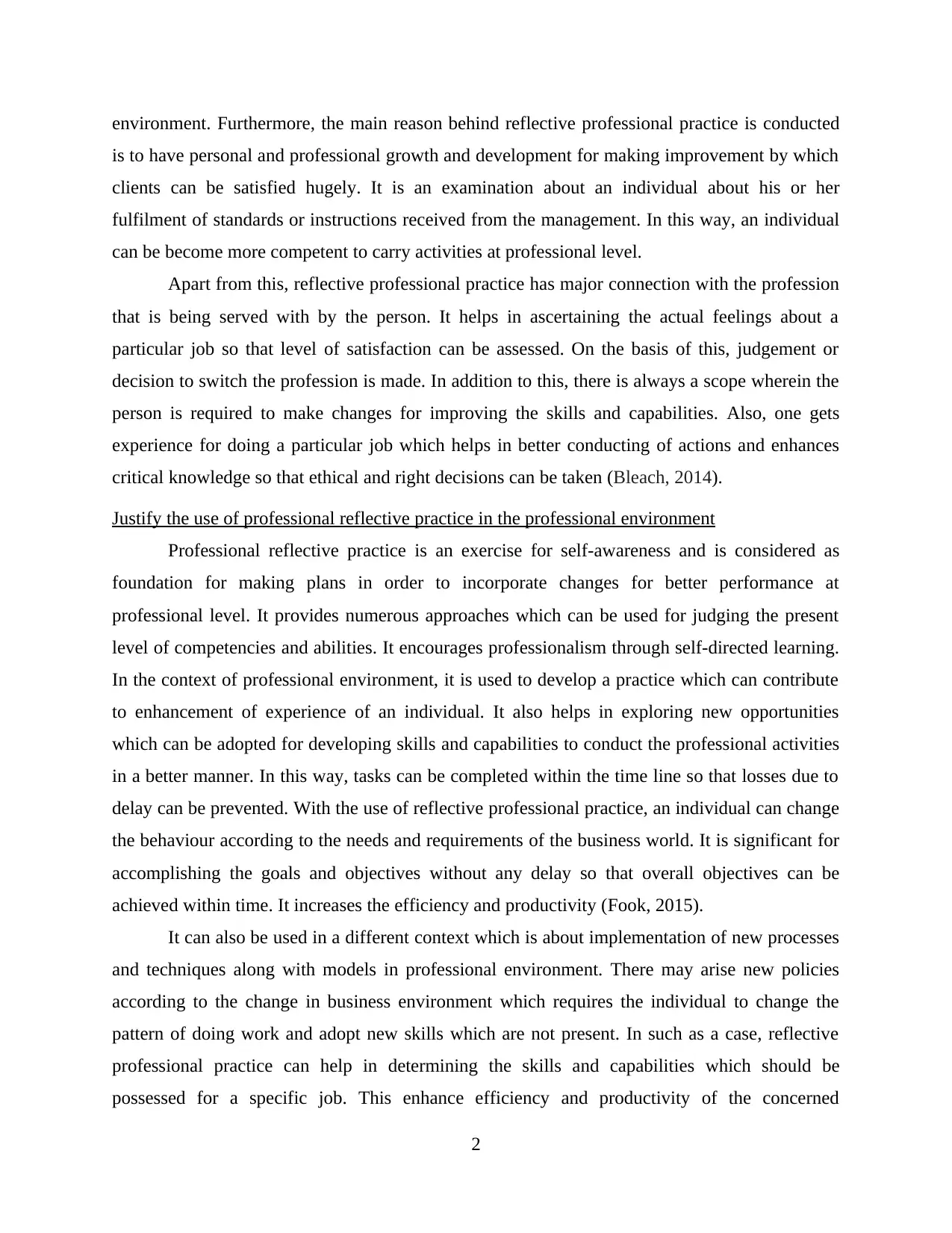
environment. Furthermore, the main reason behind reflective professional practice is conducted
is to have personal and professional growth and development for making improvement by which
clients can be satisfied hugely. It is an examination about an individual about his or her
fulfilment of standards or instructions received from the management. In this way, an individual
can be become more competent to carry activities at professional level.
Apart from this, reflective professional practice has major connection with the profession
that is being served with by the person. It helps in ascertaining the actual feelings about a
particular job so that level of satisfaction can be assessed. On the basis of this, judgement or
decision to switch the profession is made. In addition to this, there is always a scope wherein the
person is required to make changes for improving the skills and capabilities. Also, one gets
experience for doing a particular job which helps in better conducting of actions and enhances
critical knowledge so that ethical and right decisions can be taken (Bleach, 2014).
Justify the use of professional reflective practice in the professional environment
Professional reflective practice is an exercise for self-awareness and is considered as
foundation for making plans in order to incorporate changes for better performance at
professional level. It provides numerous approaches which can be used for judging the present
level of competencies and abilities. It encourages professionalism through self-directed learning.
In the context of professional environment, it is used to develop a practice which can contribute
to enhancement of experience of an individual. It also helps in exploring new opportunities
which can be adopted for developing skills and capabilities to conduct the professional activities
in a better manner. In this way, tasks can be completed within the time line so that losses due to
delay can be prevented. With the use of reflective professional practice, an individual can change
the behaviour according to the needs and requirements of the business world. It is significant for
accomplishing the goals and objectives without any delay so that overall objectives can be
achieved within time. It increases the efficiency and productivity (Fook, 2015).
It can also be used in a different context which is about implementation of new processes
and techniques along with models in professional environment. There may arise new policies
according to the change in business environment which requires the individual to change the
pattern of doing work and adopt new skills which are not present. In such as a case, reflective
professional practice can help in determining the skills and capabilities which should be
possessed for a specific job. This enhance efficiency and productivity of the concerned
2
is to have personal and professional growth and development for making improvement by which
clients can be satisfied hugely. It is an examination about an individual about his or her
fulfilment of standards or instructions received from the management. In this way, an individual
can be become more competent to carry activities at professional level.
Apart from this, reflective professional practice has major connection with the profession
that is being served with by the person. It helps in ascertaining the actual feelings about a
particular job so that level of satisfaction can be assessed. On the basis of this, judgement or
decision to switch the profession is made. In addition to this, there is always a scope wherein the
person is required to make changes for improving the skills and capabilities. Also, one gets
experience for doing a particular job which helps in better conducting of actions and enhances
critical knowledge so that ethical and right decisions can be taken (Bleach, 2014).
Justify the use of professional reflective practice in the professional environment
Professional reflective practice is an exercise for self-awareness and is considered as
foundation for making plans in order to incorporate changes for better performance at
professional level. It provides numerous approaches which can be used for judging the present
level of competencies and abilities. It encourages professionalism through self-directed learning.
In the context of professional environment, it is used to develop a practice which can contribute
to enhancement of experience of an individual. It also helps in exploring new opportunities
which can be adopted for developing skills and capabilities to conduct the professional activities
in a better manner. In this way, tasks can be completed within the time line so that losses due to
delay can be prevented. With the use of reflective professional practice, an individual can change
the behaviour according to the needs and requirements of the business world. It is significant for
accomplishing the goals and objectives without any delay so that overall objectives can be
achieved within time. It increases the efficiency and productivity (Fook, 2015).
It can also be used in a different context which is about implementation of new processes
and techniques along with models in professional environment. There may arise new policies
according to the change in business environment which requires the individual to change the
pattern of doing work and adopt new skills which are not present. In such as a case, reflective
professional practice can help in determining the skills and capabilities which should be
possessed for a specific job. This enhance efficiency and productivity of the concerned
2
Paraphrase This Document
Need a fresh take? Get an instant paraphrase of this document with our AI Paraphraser
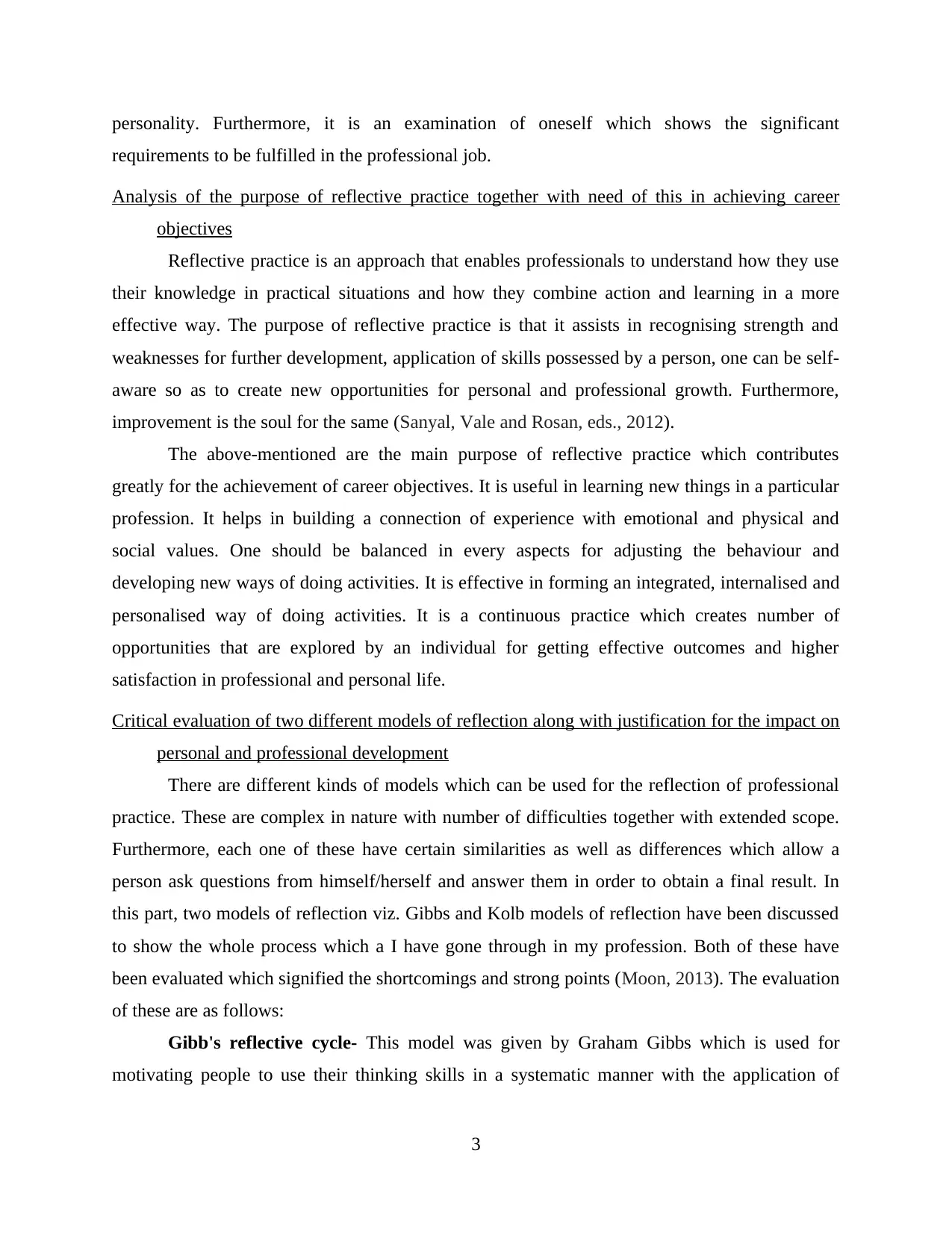
personality. Furthermore, it is an examination of oneself which shows the significant
requirements to be fulfilled in the professional job.
Analysis of the purpose of reflective practice together with need of this in achieving career
objectives
Reflective practice is an approach that enables professionals to understand how they use
their knowledge in practical situations and how they combine action and learning in a more
effective way. The purpose of reflective practice is that it assists in recognising strength and
weaknesses for further development, application of skills possessed by a person, one can be self-
aware so as to create new opportunities for personal and professional growth. Furthermore,
improvement is the soul for the same (Sanyal, Vale and Rosan, eds., 2012).
The above-mentioned are the main purpose of reflective practice which contributes
greatly for the achievement of career objectives. It is useful in learning new things in a particular
profession. It helps in building a connection of experience with emotional and physical and
social values. One should be balanced in every aspects for adjusting the behaviour and
developing new ways of doing activities. It is effective in forming an integrated, internalised and
personalised way of doing activities. It is a continuous practice which creates number of
opportunities that are explored by an individual for getting effective outcomes and higher
satisfaction in professional and personal life.
Critical evaluation of two different models of reflection along with justification for the impact on
personal and professional development
There are different kinds of models which can be used for the reflection of professional
practice. These are complex in nature with number of difficulties together with extended scope.
Furthermore, each one of these have certain similarities as well as differences which allow a
person ask questions from himself/herself and answer them in order to obtain a final result. In
this part, two models of reflection viz. Gibbs and Kolb models of reflection have been discussed
to show the whole process which a I have gone through in my profession. Both of these have
been evaluated which signified the shortcomings and strong points (Moon, 2013). The evaluation
of these are as follows:
Gibb's reflective cycle- This model was given by Graham Gibbs which is used for
motivating people to use their thinking skills in a systematic manner with the application of
3
requirements to be fulfilled in the professional job.
Analysis of the purpose of reflective practice together with need of this in achieving career
objectives
Reflective practice is an approach that enables professionals to understand how they use
their knowledge in practical situations and how they combine action and learning in a more
effective way. The purpose of reflective practice is that it assists in recognising strength and
weaknesses for further development, application of skills possessed by a person, one can be self-
aware so as to create new opportunities for personal and professional growth. Furthermore,
improvement is the soul for the same (Sanyal, Vale and Rosan, eds., 2012).
The above-mentioned are the main purpose of reflective practice which contributes
greatly for the achievement of career objectives. It is useful in learning new things in a particular
profession. It helps in building a connection of experience with emotional and physical and
social values. One should be balanced in every aspects for adjusting the behaviour and
developing new ways of doing activities. It is effective in forming an integrated, internalised and
personalised way of doing activities. It is a continuous practice which creates number of
opportunities that are explored by an individual for getting effective outcomes and higher
satisfaction in professional and personal life.
Critical evaluation of two different models of reflection along with justification for the impact on
personal and professional development
There are different kinds of models which can be used for the reflection of professional
practice. These are complex in nature with number of difficulties together with extended scope.
Furthermore, each one of these have certain similarities as well as differences which allow a
person ask questions from himself/herself and answer them in order to obtain a final result. In
this part, two models of reflection viz. Gibbs and Kolb models of reflection have been discussed
to show the whole process which a I have gone through in my profession. Both of these have
been evaluated which signified the shortcomings and strong points (Moon, 2013). The evaluation
of these are as follows:
Gibb's reflective cycle- This model was given by Graham Gibbs which is used for
motivating people to use their thinking skills in a systematic manner with the application of
3
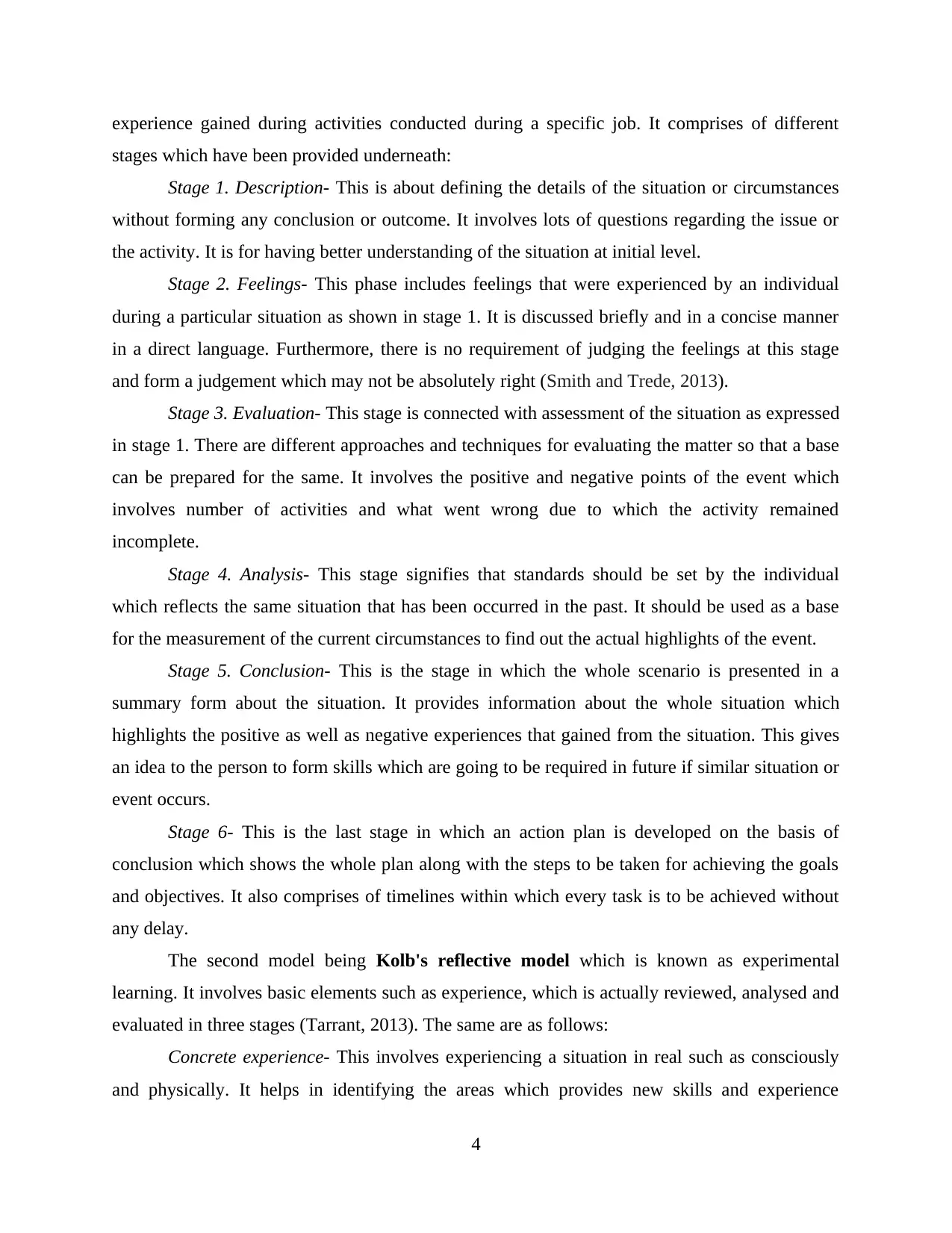
experience gained during activities conducted during a specific job. It comprises of different
stages which have been provided underneath:
Stage 1. Description- This is about defining the details of the situation or circumstances
without forming any conclusion or outcome. It involves lots of questions regarding the issue or
the activity. It is for having better understanding of the situation at initial level.
Stage 2. Feelings- This phase includes feelings that were experienced by an individual
during a particular situation as shown in stage 1. It is discussed briefly and in a concise manner
in a direct language. Furthermore, there is no requirement of judging the feelings at this stage
and form a judgement which may not be absolutely right (Smith and Trede, 2013).
Stage 3. Evaluation- This stage is connected with assessment of the situation as expressed
in stage 1. There are different approaches and techniques for evaluating the matter so that a base
can be prepared for the same. It involves the positive and negative points of the event which
involves number of activities and what went wrong due to which the activity remained
incomplete.
Stage 4. Analysis- This stage signifies that standards should be set by the individual
which reflects the same situation that has been occurred in the past. It should be used as a base
for the measurement of the current circumstances to find out the actual highlights of the event.
Stage 5. Conclusion- This is the stage in which the whole scenario is presented in a
summary form about the situation. It provides information about the whole situation which
highlights the positive as well as negative experiences that gained from the situation. This gives
an idea to the person to form skills which are going to be required in future if similar situation or
event occurs.
Stage 6- This is the last stage in which an action plan is developed on the basis of
conclusion which shows the whole plan along with the steps to be taken for achieving the goals
and objectives. It also comprises of timelines within which every task is to be achieved without
any delay.
The second model being Kolb's reflective model which is known as experimental
learning. It involves basic elements such as experience, which is actually reviewed, analysed and
evaluated in three stages (Tarrant, 2013). The same are as follows:
Concrete experience- This involves experiencing a situation in real such as consciously
and physically. It helps in identifying the areas which provides new skills and experience
4
stages which have been provided underneath:
Stage 1. Description- This is about defining the details of the situation or circumstances
without forming any conclusion or outcome. It involves lots of questions regarding the issue or
the activity. It is for having better understanding of the situation at initial level.
Stage 2. Feelings- This phase includes feelings that were experienced by an individual
during a particular situation as shown in stage 1. It is discussed briefly and in a concise manner
in a direct language. Furthermore, there is no requirement of judging the feelings at this stage
and form a judgement which may not be absolutely right (Smith and Trede, 2013).
Stage 3. Evaluation- This stage is connected with assessment of the situation as expressed
in stage 1. There are different approaches and techniques for evaluating the matter so that a base
can be prepared for the same. It involves the positive and negative points of the event which
involves number of activities and what went wrong due to which the activity remained
incomplete.
Stage 4. Analysis- This stage signifies that standards should be set by the individual
which reflects the same situation that has been occurred in the past. It should be used as a base
for the measurement of the current circumstances to find out the actual highlights of the event.
Stage 5. Conclusion- This is the stage in which the whole scenario is presented in a
summary form about the situation. It provides information about the whole situation which
highlights the positive as well as negative experiences that gained from the situation. This gives
an idea to the person to form skills which are going to be required in future if similar situation or
event occurs.
Stage 6- This is the last stage in which an action plan is developed on the basis of
conclusion which shows the whole plan along with the steps to be taken for achieving the goals
and objectives. It also comprises of timelines within which every task is to be achieved without
any delay.
The second model being Kolb's reflective model which is known as experimental
learning. It involves basic elements such as experience, which is actually reviewed, analysed and
evaluated in three stages (Tarrant, 2013). The same are as follows:
Concrete experience- This involves experiencing a situation in real such as consciously
and physically. It helps in identifying the areas which provides new skills and experience
4
⊘ This is a preview!⊘
Do you want full access?
Subscribe today to unlock all pages.

Trusted by 1+ million students worldwide
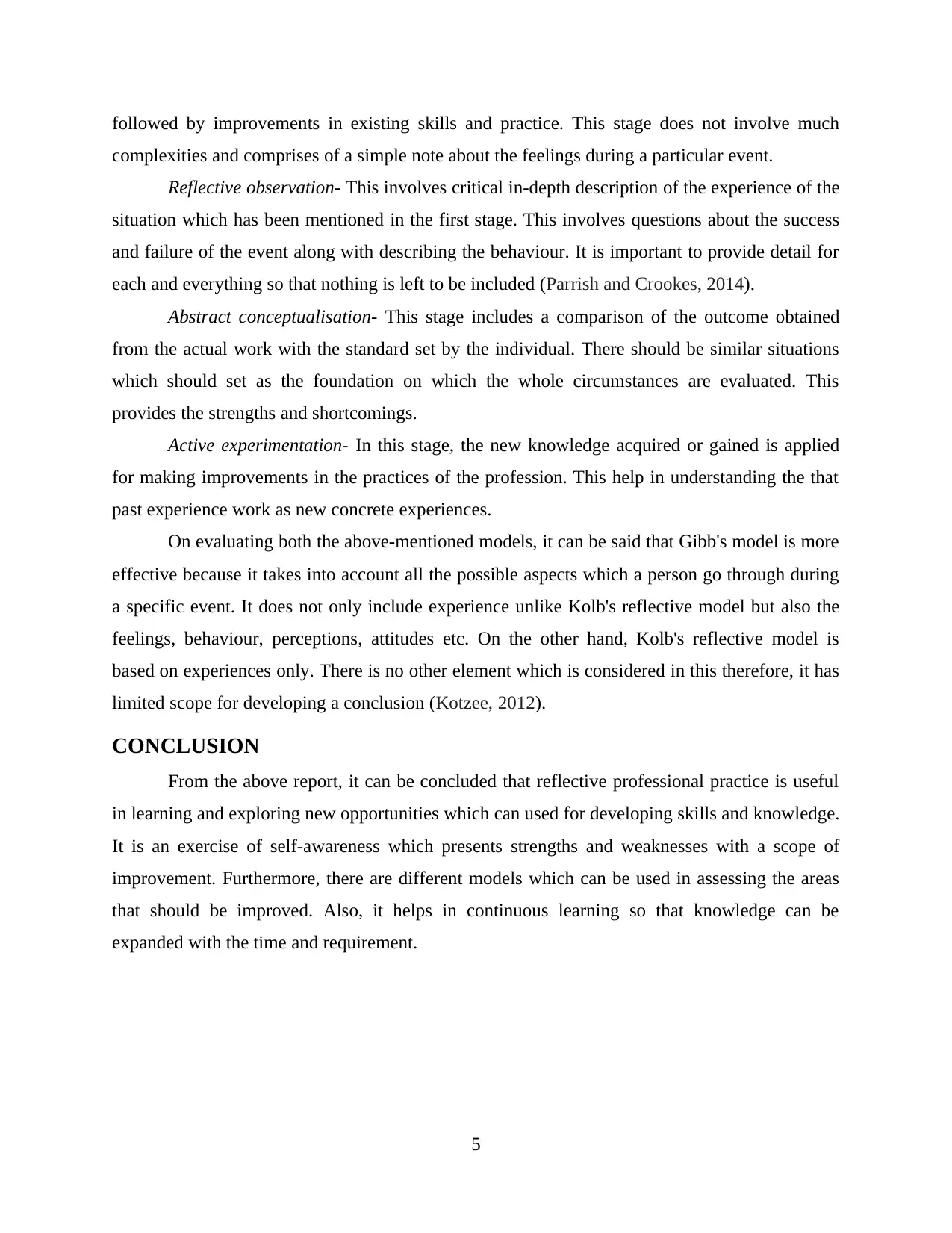
followed by improvements in existing skills and practice. This stage does not involve much
complexities and comprises of a simple note about the feelings during a particular event.
Reflective observation- This involves critical in-depth description of the experience of the
situation which has been mentioned in the first stage. This involves questions about the success
and failure of the event along with describing the behaviour. It is important to provide detail for
each and everything so that nothing is left to be included (Parrish and Crookes, 2014).
Abstract conceptualisation- This stage includes a comparison of the outcome obtained
from the actual work with the standard set by the individual. There should be similar situations
which should set as the foundation on which the whole circumstances are evaluated. This
provides the strengths and shortcomings.
Active experimentation- In this stage, the new knowledge acquired or gained is applied
for making improvements in the practices of the profession. This help in understanding the that
past experience work as new concrete experiences.
On evaluating both the above-mentioned models, it can be said that Gibb's model is more
effective because it takes into account all the possible aspects which a person go through during
a specific event. It does not only include experience unlike Kolb's reflective model but also the
feelings, behaviour, perceptions, attitudes etc. On the other hand, Kolb's reflective model is
based on experiences only. There is no other element which is considered in this therefore, it has
limited scope for developing a conclusion (Kotzee, 2012).
CONCLUSION
From the above report, it can be concluded that reflective professional practice is useful
in learning and exploring new opportunities which can used for developing skills and knowledge.
It is an exercise of self-awareness which presents strengths and weaknesses with a scope of
improvement. Furthermore, there are different models which can be used in assessing the areas
that should be improved. Also, it helps in continuous learning so that knowledge can be
expanded with the time and requirement.
5
complexities and comprises of a simple note about the feelings during a particular event.
Reflective observation- This involves critical in-depth description of the experience of the
situation which has been mentioned in the first stage. This involves questions about the success
and failure of the event along with describing the behaviour. It is important to provide detail for
each and everything so that nothing is left to be included (Parrish and Crookes, 2014).
Abstract conceptualisation- This stage includes a comparison of the outcome obtained
from the actual work with the standard set by the individual. There should be similar situations
which should set as the foundation on which the whole circumstances are evaluated. This
provides the strengths and shortcomings.
Active experimentation- In this stage, the new knowledge acquired or gained is applied
for making improvements in the practices of the profession. This help in understanding the that
past experience work as new concrete experiences.
On evaluating both the above-mentioned models, it can be said that Gibb's model is more
effective because it takes into account all the possible aspects which a person go through during
a specific event. It does not only include experience unlike Kolb's reflective model but also the
feelings, behaviour, perceptions, attitudes etc. On the other hand, Kolb's reflective model is
based on experiences only. There is no other element which is considered in this therefore, it has
limited scope for developing a conclusion (Kotzee, 2012).
CONCLUSION
From the above report, it can be concluded that reflective professional practice is useful
in learning and exploring new opportunities which can used for developing skills and knowledge.
It is an exercise of self-awareness which presents strengths and weaknesses with a scope of
improvement. Furthermore, there are different models which can be used in assessing the areas
that should be improved. Also, it helps in continuous learning so that knowledge can be
expanded with the time and requirement.
5
Paraphrase This Document
Need a fresh take? Get an instant paraphrase of this document with our AI Paraphraser
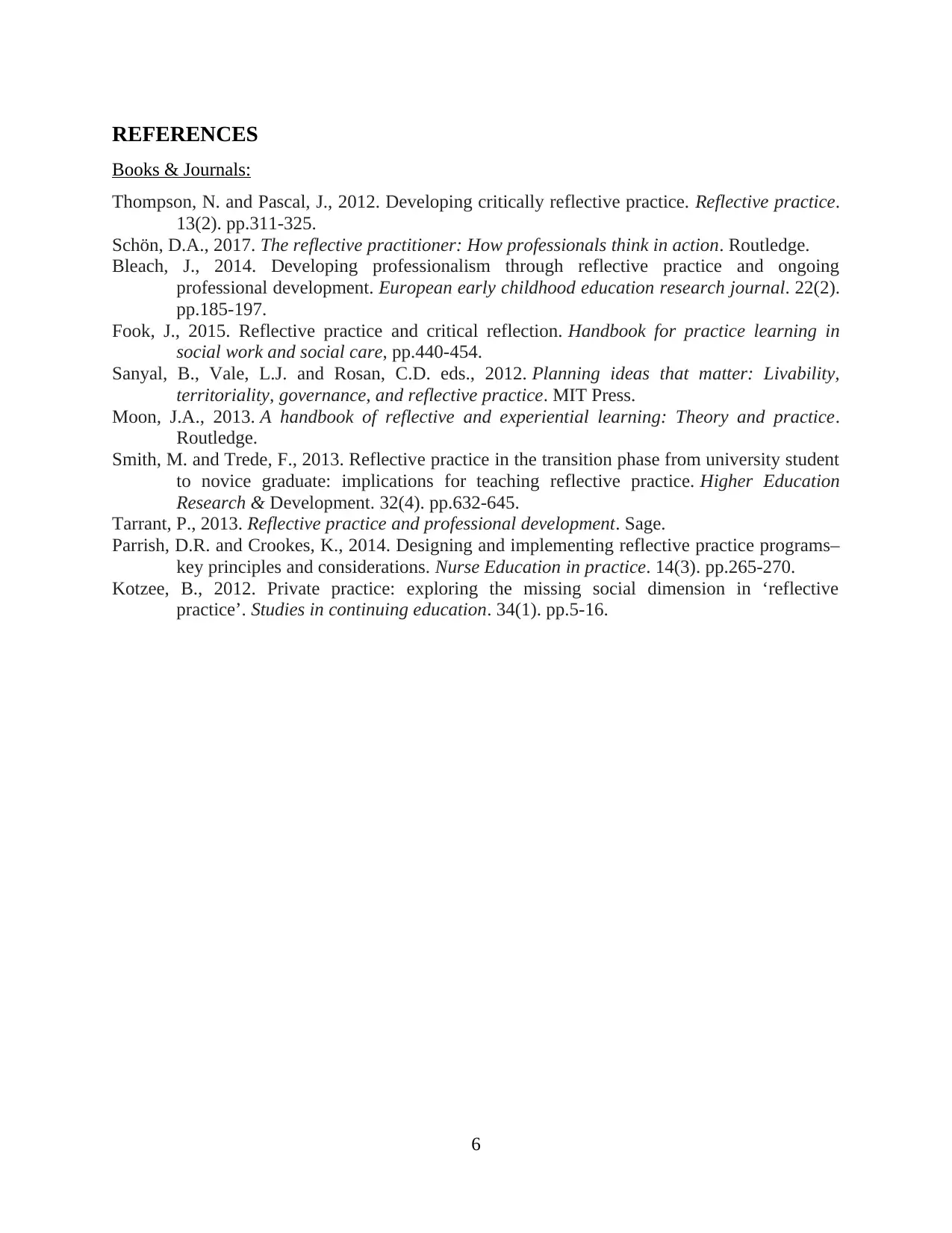
REFERENCES
Books & Journals:
Thompson, N. and Pascal, J., 2012. Developing critically reflective practice. Reflective practice.
13(2). pp.311-325.
Schön, D.A., 2017. The reflective practitioner: How professionals think in action. Routledge.
Bleach, J., 2014. Developing professionalism through reflective practice and ongoing
professional development. European early childhood education research journal. 22(2).
pp.185-197.
Fook, J., 2015. Reflective practice and critical reflection. Handbook for practice learning in
social work and social care, pp.440-454.
Sanyal, B., Vale, L.J. and Rosan, C.D. eds., 2012. Planning ideas that matter: Livability,
territoriality, governance, and reflective practice. MIT Press.
Moon, J.A., 2013. A handbook of reflective and experiential learning: Theory and practice.
Routledge.
Smith, M. and Trede, F., 2013. Reflective practice in the transition phase from university student
to novice graduate: implications for teaching reflective practice. Higher Education
Research & Development. 32(4). pp.632-645.
Tarrant, P., 2013. Reflective practice and professional development. Sage.
Parrish, D.R. and Crookes, K., 2014. Designing and implementing reflective practice programs–
key principles and considerations. Nurse Education in practice. 14(3). pp.265-270.
Kotzee, B., 2012. Private practice: exploring the missing social dimension in ‘reflective
practice’. Studies in continuing education. 34(1). pp.5-16.
6
Books & Journals:
Thompson, N. and Pascal, J., 2012. Developing critically reflective practice. Reflective practice.
13(2). pp.311-325.
Schön, D.A., 2017. The reflective practitioner: How professionals think in action. Routledge.
Bleach, J., 2014. Developing professionalism through reflective practice and ongoing
professional development. European early childhood education research journal. 22(2).
pp.185-197.
Fook, J., 2015. Reflective practice and critical reflection. Handbook for practice learning in
social work and social care, pp.440-454.
Sanyal, B., Vale, L.J. and Rosan, C.D. eds., 2012. Planning ideas that matter: Livability,
territoriality, governance, and reflective practice. MIT Press.
Moon, J.A., 2013. A handbook of reflective and experiential learning: Theory and practice.
Routledge.
Smith, M. and Trede, F., 2013. Reflective practice in the transition phase from university student
to novice graduate: implications for teaching reflective practice. Higher Education
Research & Development. 32(4). pp.632-645.
Tarrant, P., 2013. Reflective practice and professional development. Sage.
Parrish, D.R. and Crookes, K., 2014. Designing and implementing reflective practice programs–
key principles and considerations. Nurse Education in practice. 14(3). pp.265-270.
Kotzee, B., 2012. Private practice: exploring the missing social dimension in ‘reflective
practice’. Studies in continuing education. 34(1). pp.5-16.
6

7
⊘ This is a preview!⊘
Do you want full access?
Subscribe today to unlock all pages.

Trusted by 1+ million students worldwide
1 out of 9
Related Documents
Your All-in-One AI-Powered Toolkit for Academic Success.
+13062052269
info@desklib.com
Available 24*7 on WhatsApp / Email
![[object Object]](/_next/static/media/star-bottom.7253800d.svg)
Unlock your academic potential
Copyright © 2020–2026 A2Z Services. All Rights Reserved. Developed and managed by ZUCOL.





